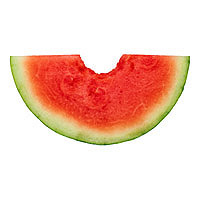Melons

Varieties
Summer melons include the following:
Watermelon
This large melon can weigh from just a few pounds (about 454 to 1,360 grams) to up to 90 pounds (40.5 kg). It has a water content of up to 95 percent and is a popular summer treat, eaten sliced, or cut into fruit salad. It wears a green rind (some varieties have pale green stripes), with red, white, yellow, or pink flesh, and can be found in a round, oval, or oblong shape, with seeds and seedless. The watermelon is said to be African in origin, with over 50 varieties in existence worldwide.
Cantaloupe
Called Charentais in France, cantaloupes have orange flesh and a distinctive taupe, rough-surfaced rind, sometimes with green stripes. What Americans call cantaloupes are in reality a variety of muskmelon.
Muskmelon
Also called netted melons, muskmelons are round, with orange flesh and a ruddy beige “netted” skin. Several hybrid varieties exist that combine desirable characteristics of the muskmelon and cantaloupe.
Cranshaw
This is an oval-shaped summer melon with a golden-yellow rind.
Winter melons (available in American markets, but imported from tropical climates) include the following:
Honeydew
These melons have a smooth, pale-green to creamy yellow skin with sweet, pale-green flesh. Honeydews can range in shape from round to oval and usually weigh from 3 to 6 pounds (about 1,362 to 2724g).
Casaba
Casabas are round or oval melons with yellow or orange skin that is green at the ends. The flesh is creamy white.
Canary
Fragrant when ripe, these oblong melons have bright yellow rinds and sweet, off-white flesh.
Persian
This variety looks like a large muskmelon. It has dark green skin with taupe netting and firm orange flesh.
Prince
Similar to a honeydew in outer appearance, the round Prince melon has orange flesh.
Ogen
This is a small, round, hybrid melon created in the 1960s on an Israeli kibbutz. It usually has green to yellow skin with juicy pink or light green flesh.
Galia
Also an Israeli hybrid, this melon has a beige rind and aromatic, light green flesh.
Santa Claus
This oblong melon has yellow skin with prominent green and black stripes. The Santa Claus melon has a pale green flesh similar to that of a honeydew.
Copyright © 2026 TraceGains, Inc. All rights reserved.
Learn more about TraceGains, the company.
The information presented in the Food Guide is for informational purposes only and was created by a team of US–registered dietitians and food experts. Consult your doctor, practitioner, and/or pharmacist for any health problem and before using any supplements, making dietary changes, or before making any changes in prescribed medications. Information expires December 2026.














